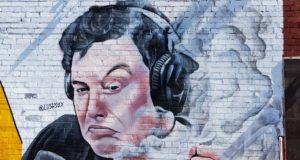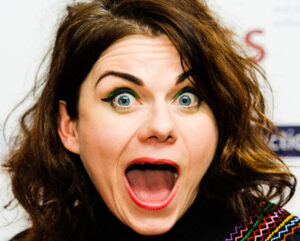“Bliss was it in that dawn to be online, but to be chatting shit with your mates was very heaven” — William Wordsworth
It’s been a while since anyone would believe any ascribed quote on Twitter. In my trembling little bubble at least, people have been saying the site is clinically dead for at least two years — although admittedly I do follow a lot of tired, cynical journalists. And let me tell you, they are mad as hell, and they are not going to take it anymore. In real terms, freelance rates are lower than they were in the last millennium. No wonder so many of them decided the only route to solvency was to monetise themselves. Those of us who remained on the Twitter mothership during and after the pandemic watched an exodus of solo shuttlecraft head into the new media business-model troposphere. There they remain in geo-stationary orbit, a flotilla of atomised Substacks.
Everyone seems sort of resigned now to social media becoming less interesting and to us all spending less time on it. Nothing lasts forever. Twitter went from agreeable agora (c.2008) to brittle umbrage mill (c.2012) to enraged existential mobclash (c.2016) to a colourised trench-warfare horror scene. Then, it was sold.
It felt odd. Twitter always had the illusion of being, not publicly owned exactly, but common land at least. It was just there, like the roads and parks and pavements and internet. Suddenly it was worth $44 billion? Oh, but there was worse to come. The self-acknowledged Coolest White Guy on Earth had bought the site. And, excitingly, there was even worse to come. Artificially Intelligent Caligula was about to implement his Plan:
Phase 1: Sack all non-suck-ups and losers.
Phase 2: Wipe 70% off market value (totally cool, hold your nerve bro).
Phase 3: Invite back all the weird angry people previously banned.
Phase 4: Change name from Twitter (lame) to X (super-cool, mysterious).
Phase 5: Introduce frequent ad hurdles to acclimatise users to revenue grooming.
Phase 6: Introduce blue-tick charge to acclimatise users to subscription fracking.
Phase 7: Kick back. Wait for the world to deal with radical vibe shift.
It’s a far cry from those calm, underpopulated early days. Remember being on Twitter then, when it felt like everybody was in a social media sitcom. Silly puns and harmless banter — on one level, it seemed a shortcut to sophistication. There you were at some psychedelic Algonquin Round Table, wisecracking with preposterously accessible famous people as if you belonged there. Bloody hell, Caitlin Moran just retweeted a gag of mine and I’ve got 500 new followers! Ooh, Stephen Fry liked something I said and now I’ve got people in my timeline saying things like “Ahoy old chap!” Oh good, Piers Morgan’s alerted his adoring fans to some crack I made about Test Match Special and now I’ve got a dickhead with numbers for a name saying something horrible about a photo of my baby granddaughter.
At another level, it was an infant-school playground with randoms tearing around making friends in a hurry. I started to follow a very wide spectrum of people interested in comedy and music and politics and beyond. I now look back to 2008 and realise that the overwhelming majority of my current non-professional friends were made then, on Twitter. We’d meet occasionally in Soho pubs, and everyone was exactly like the online version of themselves.
Maybe it was possible to build a social media community, but how would that work? By simply assembling a genial cross-section of liberal-Left Twitter? No. In a real community, you’re not shouting about Daily Mail headlines in the street. You have no idea what Sheila over the road’s views on Self-ID are, or what the builder at number 36 thinks about Just Stop Oil. I mean, you have an inkling. But their precise positions are not articulated in pithy, unequivocal one-liners in block capitals filling their front windows. I don’t know what your street’s like, but the most we’ve had around here was a Not My King sign and a missing tortoise poster.
The golden age of Twitter, like that of the fabled pre-war Edwardian version, was simply a long summer with benevolent weather. 2009 was the turning point for me. We still had a Labour government, just. My carefully curated Twitter circle was a model village of civilised people, insulated from the hateful wrongness of the outside world. Then, as now, the one thing Twitter was really good at was breaking news, which was the usual slurry of national misery and international catastrophe, with little shards of personal tragedy.
And, inevitably, tragedy sometimes happens to people you don’t like. David Cameron’s six-year-old son Ivan, who had severe epilepsy and cerebral palsy, died suddenly. Cameron paid a moving tribute to the NHS staff who had cared for him. Prime Minister Gordon Brown (weird, typing that phrase) had himself lost a child, and spoke on behalf of all of us when he offered heartfelt condolences.
Well, nearly all of us. By then Twitter encouraged people to bark their own brutal truth to power. One of the people I followed tweeted with a shrug that the net result of Ivan Cameron’s death was one fewer potential Tory in the world. I stared and stared at it, trying to discern some reflexive, ironic meta-joke I hadn’t quite understood — but no, that was the whole tweet. Child’s death, silver lining. I told the person that it was a horrible thing to say. They refused to apologise, and explained that they struggled with tone. Who was the real victim here?
Clearly, if I could be shocked, it was because I had been hypnotised by the geniality of my magic circle. Perhaps following a few arseholes would give me some perspective. After all, we don’t like everyone in an actual community, do we? Even people we like wind us up now and then. Maybe mixing a few bad people into my Follows would make this illusory community more “real” somehow. I started with a few easy ones, including the exotically named Iain Martin, my alternative-reality centre-Right counterpart. I was always getting abused for something he’d written; he’d got mistaken for me a few times.
But I wanted to see what it would be like if you followed only terrible people. For a month, I went experimentally dark. I followed Westboro Baptist church members, Holocaust deniers, Islamophobes, homophobes, all the phobes, all personally wounded by the injustice of “these people” just being in their eyeline. Misogynists were everywhere, social media affirming the warning Germaine Greer had sounded half a century earlier — that women have very little idea of just how much men hate them. Now, they had a very keen understanding of exactly how much. There were men, hating them graphically, cruelly, dismissively, in plain sight.
Sometimes, I tried engaging. A few of the hateful people were perfectly civil. I had several conversations with a cheerful woman from Sarah Palin’s office who had every sympathy for me, living in England under the yoke of Marxism. She told me how the NHS worked (death panels, population control) and how Birmingham was a Sharia state. No guns, that was our problem.
Not many of the other accounts I followed seemed to do light conversation. Confederate Nazis called me the worst thing they could think of (gay) and wished unimaginative ill upon me, with unimaginative swearing. Someone even went to the trouble of opening a Twitter account in my name, simply to post me warnings. The just-for-you revenge Twitter account became a thing. The nastier ones, as always, were targeting women, set up by men obsessed with their former partners. I had my own for a while, bless him. Definitely a him. He followed only me, posted to only me. By the time he sighed his last message, he seemed exhausted by the whole enterprise: “I hope that everyone you ever loved is dead.”
It’s tempting, of course, to project my own weary old man’s vibe shift — weltschmerz to ennui — onto the blank, threadbare screen. The renamed site may be under new management, but everyone seems to be doing that Unicode “shrug” emoji, expecting not a renewal but a gentle unmooring. Approximately nobody is ever going to call it X. Twitter will remain a vital channel for mutual support groups, for campaigners, for people plugging their work. But honestly, in terms of human interaction, it was always faddish. That was its point. It was born to die.
Twitter and I are losing interest in one another; it can’t even be bothered to pester me with vaguely relevant ads. Like many others, I’m just running down the clock now as it enters its Sunset Boulevard phase. It’s slowly leaving me, not the other way round.
Disclaimer
Some of the posts we share are controversial and we do not necessarily agree with them in the whole extend. Sometimes we agree with the content or part of it but we do not agree with the narration or language. Nevertheless we find them somehow interesting, valuable and/or informative or we share them, because we strongly believe in freedom of speech, free press and journalism. We strongly encourage you to have a critical approach to all the content, do your own research and analysis to build your own opinion.
We would be glad to have your feedback.
Source: UnHerd Read the original article here: https://unherd.com/




